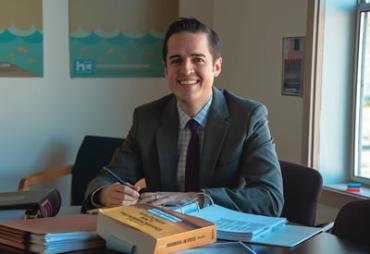This story originally appeared in Lawyer, Spring 2019.
Alumnus fights on behalf of Hanford whistleblowers
Think of attorney Nikolas Peterson '12 as a modern-day David.

For the past six years, he has faced a metaphorical Goliath that has the potential to unleash a catastrophe throughout much of the Pacific Northwest: the Hanford Nuclear Reservation, a sprawling, decommissioned facility in the Tri-Cities area of Eastern Washington. As a staff attorney for a small Seattle-based watchdog organization, he uses his legal skills and education to ensure the site remains safe for workers and surrounding communities.
Peterson revels in his David vs. Goliath role. That's because he has been remarkably successful advocating for his clients — Hanford workers who report unsafe practices — despite formidable opposition from large corporations employing teams of skilled attorneys. "Working on these issues has given me a lot of faith in the legal system, that justice is still achievable despite the power and resource imbalances at work," he said.
As the most contaminated nuclear site in the United States — containing 53 million gallons of radioactive waste — Hanford is the focus of the world's largest environmental cleanup project, with nearly 11,000 workers and billions of dollars budgeted. Overseen by the U.S. Department of Energy (DOE) and performed by a variety of contractors, the cleanup has been hampered by accidents, safety lapses, and more. Hanford Challenge, where Peterson works, is a nonprofit watchdog group dedicated to holding those in charge accountable.
A fourth-generation Washingtonian, Peterson was drawn to a career in law to effect positive change in his home state. At Seattle U Law, he found a supportive community of like-minded students dedicated to public interest law. With the help of an environmental law fellowship, and with the encouragement of his mentor, Professor Robert Boruchowitz, he interned at Hanford Challenge.
"It was an incredible experience. I could see firsthand what was happening to workers who spoke out. But they are the ones making sure the cleanup is safe and protecting us from a nuclear accident," he said. "It was rewarding to help resolve their cases and to see positive change."
His passion for the work led to a full-time position as the nonprofit's legal director. Working out of a small, six-person office as the only attorney on staff (aside from the executive director), Peterson represents workers who witness dangerous and often illegal practices and don't know where to turn.
Though he was intimidated in the beginning, Peterson has since built his knowledge, experience, and track record on this issue. That comes from handling more than 20 cases - he has successfully settled most before trial — and providing legal advice to hundreds more workers. In order to avoid endless litigation, he's also developed productive relationships with both the DOE and its contractors, which requires balance.
"We always try to work together first. But what's great about working for an independent organization is that we have the ability to call people out," he said. Those in charge of the cleanup "understand that we can make things difficult if they don't change."
The case of Shelly Doss is emblematic of Peterson's impact. As an environmental specialist for a Hanford contractor, her job was to ensure the company's compliance with regulations. When she voiced concerns about unsafe practices, Doss was illegally terminated under the guise of a layoff (according to a later federal finding). She knew she had a strong whistleblower case, but finding an attorney to represent her proved difficult.
"No attorneys who I came across wanted anything to do with this. But the violations were so egregious that I had to speak out," she said. "Nikolas was instrumental in helping me. He understood how my life came to a screeching halt because of this, and his steady hand assured me we were going down the right path."
After four years, the matter was satisfactorily resolved, enabling Doss to get her life back on track.
His work has undoubtedly helped to secure relief for workers and protect them from retaliation. But because Hanford will affect generations to come, his focus is much broader. He relentlessly advocates for policy changes to prevent future harm that could result.
According to the Washington State Department of Ecology, nuclear waste at Hanford has been seeping into and contaminating the soil and groundwater as a result of improper storage. Failure to adequately secure and store the waste could lead to a catastrophic release of radioactive material, causing a public health emergency and billions of dollars in economic losses, not to mention incalculable harm to the surrounding environment. One need only look to the aftermath of the 2011 earthquake and tsunami in Japan, which seriously damaged a nuclear facility, to understand the risk.
This concern compels Peterson to testify before the Washington State Legislature, help draft new laws, and give interviews in popular media (he's spoken with comedian John Oliver's HBO show, for instance).
"We should all care about this issue, because if we don't get the cleanup right, there are all sorts of risks. A bad day at Hanford is a bad day for a three-state area," he said. "I get to work on real solutions for individual clients, but I also get to work on solutions that will make the site better and safer for all of us."
